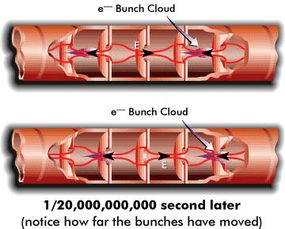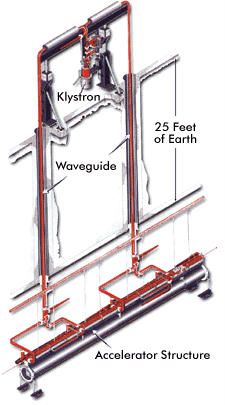Particle Source, Copper Tube and Klystrons
Particle Source
The particle source provides the particles that are to be accelerated. Particles can be electrons, protons, positrons (the first antimatter particle -- like an electron, but positively charged), ions, and nuclei of heavy atoms such as gold. At SLAC, an electron gun uses a laser to knock electrons off the surface of a semiconductor. The electrons then enter the accelerator portion of the linac.
At SLAC, positrons can be made by firing an electron beam at tungsten. In the collision, electron-positron pairs are made. The positrons can be accelerated by reversing the directions of the electric and magnetic fields within the accelerator.
Advertisement
Copper Tube

The major structure of the particle accelerator is the copper tube. The copper tube has a strong vacuum inside through which the particles travel. The tubes are made of copper because copper conducts electricity and magnetism very well. At the SLAC linac, the copper tube is made of more than 80,000 copper cylinders brazed together for more than 2 miles (3.2 km)!
The copper tube is arranged to form a series of cells called cavities. The spacing of the cavities is matched to the wavelength of the microwaves. The spacing allows the electric and magnetic fields to repeat their pattern every three cavities. Electrons or positrons in the beam come through the cavities in small bunches. The arrival of each bunch is timed so that it gets a push from the electric field across the cavities.

Klystrons
Klystrons make microwaves, much like a kitchen microwave oven except that the klystrons' microwaves are about 1 million times more powerful. Klystrons produce microwaves by way of an electron gun. The electrons travel through the klystron in cavities, where their speed is regulated. As the electrons change speed in the klystron, they give off radiation in the form of microwaves. The microwaves are conducted through copper waveguides to the copper tube of the accelerator. Waveguides carry waves efficiently without losing intensity. The klystron and waveguides are kept under high vacuum to ease the flow of the waves.
